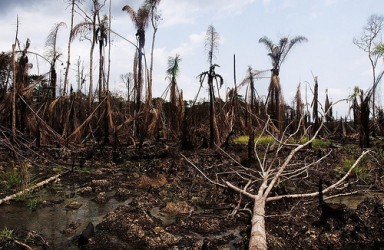The Nigerian State and Peace Building Mechanics in the Niger Delta Region
The Niger Delta featured perpetuated human insecurity, lack of infrastructure, wanton ecological damage, and perceived apathy on the part of government and the multinational oil companies in spite of the significant contribution of its crude oil to the Nigerian and global economy. The core thrust of this paper is to examine the amnesty policy as a peace building framework for addressing the lingering crisis
Inside the Anglo-Saxon War Machine
Barack Obama and Gordon Brown were both reluctant warriors, boxed in by their respective military forces. Afghanistan was a war they both inherited, and at first underestimated, defining their position on it more by contrast to Iraq than on its merits. They realised soon enough that it was going badly. Casualties and costs were rising, the progress on development was stalling since 2001 and being overtaken by corruption, and public support at home was ebbing away
Water Insecurity in the Middle East: a Cause for Conflict or Cooperation?
The Middle East is a very complex region with many factors causing states to enter into violent and intractable conflicts. The region has been adversely affected by climate change. This has led to the entire Middle East becoming dryer, thus meaning that water volumes, be it in aquifers or river basins, are declining. Therefore, water scarcity is steadily affecting food supply.
Smart Aid for African Development
For over five decades, many types of aid have been flowing into sub-Saharan Africa, and yet there is a stagnation and perhaps even a failure of significant development in the region. Smart Aid for African Development, edited by Richard Joseph and Alexandra Gillies, contains essays from a collection of authors who attempt to address the reasons why aid does not seem to promote growth in Africa by explaining the constraints to aid as it is granted today, and elaborating on effective alternative approaches
The Euro and the RMB
As an emerging power, China’s role within domains of international trade, economy and politics has increased dramatically in recent years. Accompanied with the country’s increase in international weight, the Chinese currency Renminbi (RMB) has become more and more significant in international financial market. Simultaneously, the dispute over RMB’s revaluation has recently become a recurrent theme
The Kautilya Way
In a land as diverse as India, the British championed the technique of divide and conquer for nearly a century. Three thousand years before British explorers even set foot on India’s coast, a warrior by the name of Chandragupta Maurya unified Indian heterogeneity and established unified India’s first monarchical dynasty of the Mauryas. This Bismarckian mission owed its success to Chandragupta Maurya’s astute political adviser, Kautilya.
No Crimes But Punishment: The Case of Nasrin Sotoudeh
Nasrin Soutoudeh, one of Iran’s most prominent human rights and women’s rights activist went on a hunger strike for the second time on October 31st to protest her unlawful detention and ill treatment in Iran’s Evin Prison. Last week for the first time her two children, three and eleven years old visited her in prison. They found their mother in poor heath and so frail that she could not even hug them.
Iran and Britain: The Politics of Oil and Coup D’état before the Fall of Reza Shah
British strategy in the Middle East consolidated around a sustained effort to prevent any adversarial penetration into the Persian Gulf, defending its position athwart the principal lines of communication and supply between Northern Europe and British India, and to protect the newly discovered Persian oil that was used to power the Royal Navy
On Chickens and Eggs: A Response to Joseph Nye
Academics need to make their arguments accessible and governments need to acknowledge their relevance in determining how to proceed when conceptualizing policy. Until administrations become concerned with changing the level of discourse rather than simply out maneuvering their foes on the political chessboard, any changes in the practices of academic research will fall short of re-enfranchising academics into meaningful advisory roles
Reading the Tea Leaves
On 12th September 2009, hundreds of thousands of people gathered for a “taxpayer march” in Washington, DC. The Tea party has focused public anger at Obama’s reforms and forced the political establishment to take note in the run-up to the midterm elections. But is it any more than a knee-jerk response to a Democrat president? Perhaps those who will find life most difficult will be Republican moderates. In the age of the Tea party, the bad news is likely to keep coming, and a comeback for moderate Republicanism looks some way off






